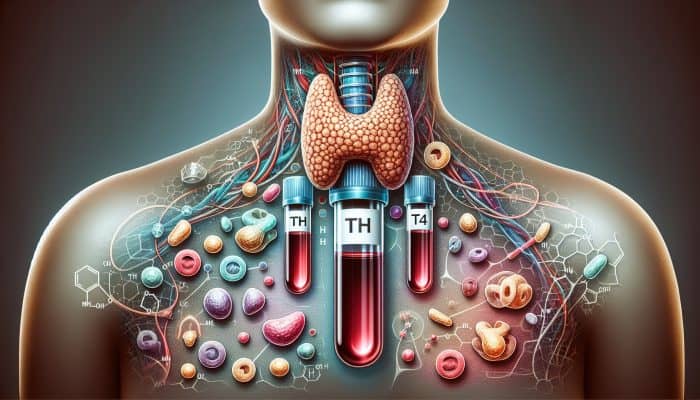Your In-Depth Resource for Deciphering Thyroid Blood Tests
Explore the Vital Importance of Thyroid Blood Tests in Monitoring Your Health

A thyroid blood test is a crucial diagnostic procedure designed to measure the levels of essential hormones produced by the thyroid gland, an important organ situated in your neck. This test plays a significant role in identifying potential thyroid function issues, which can have profound effects on your overall health. The thyroid gland is responsible for the synthesis of hormones such as TSH (Thyroid Stimulating Hormone), T4 (Thyroxine), and T3 (Triiodothyronine). These hormones are instrumental in regulating your body’s metabolism, energy production, and overall well-being. By evaluating the levels of these hormones, healthcare professionals can detect conditions like hypothyroidism, where the thyroid is underactive, or hyperthyroidism, which indicates an overactive thyroid.
Grasping these hormone levels is critical, as they guide the formulation of effective treatment plans. High TSH levels typically suggest that the thyroid is not producing enough hormones, which can lead to symptoms like persistent fatigue, unexplained weight gain, and increased sensitivity to cold. In contrast, low TSH levels may point to hyperthyroidism, which can present as unexpected weight loss, heightened anxiety, and intolerance to heat. This test is a fundamental component of health assessments, especially for those showing signs of thyroid dysfunction.
Recognising the Importance of Thyroid Testing for Your Holistic Health
If you are facing symptoms that might indicate a thyroid disorder, you may need a thyroid test. Common signs include ongoing fatigue, sudden changes in weight, mood swings, and alterations in your skin or hair texture. For example, unexplained weight gain coupled with fatigue may be indicative of hypothyroidism. Conversely, unexpected weight loss along with increased anxiety could suggest hyperthyroidism.
Moreover, healthcare providers often recommend thyroid testing as part of routine health evaluations, particularly for individuals with a family history of thyroid disorders or those with risk factors such as autoimmune diseases. In Australia, it is standard practice for general practitioners to include thyroid evaluations in regular health check-ups, emphasising the importance of early detection for effectively managing thyroid health.
Key Preparations for Your Upcoming Thyroid Blood Test
Preparing for a thyroid blood test is generally a simple process. Most people do not need to make significant changes before the test. However, adhering to specific guidelines can enhance the accuracy of your results. Your healthcare provider may recommend fasting for a short period or instruct you to avoid certain medications or supplements that could interfere with hormone levels.
If you are currently on medication for a thyroid condition, it is imperative to follow your doctor’s directives regarding whether to continue or pause your medication before the test. Strict adherence to your doctor’s recommendations ensures that reliable results are obtained. Additionally, it is crucial to inform your healthcare provider about any medications or supplements you are taking, as substances like biotin can impact test outcomes. Always consult your healthcare provider for personalised advice on how to prepare for your thyroid blood test.
Decoding Insights from Your Thyroid Test Results

Your thyroid test results offer invaluable insights into the concentrations of key thyroid hormones in your blood, specifically focusing on TSH, T3, and T4 levels. Understanding these outcomes is essential for accurate diagnosis. Elevated TSH levels frequently indicate hypothyroidism, suggesting that the thyroid is not generating sufficient hormones. Conversely, low TSH levels may suggest hyperthyroidism, signalling an overactive thyroid.
Here’s a quick reference list summarising the standard ranges for thyroid test results:
- TSH: The typical range is usually between 0.4 and 4.0 mIU/L.
- T4: Normal levels are approximately 0.8 to 1.8 ng/dL.
- T3: The normal range generally falls between 100 to 200 ng/dL.
- Free T4: Normal levels hover around 0.7 to 1.9 ng/dL.
- Free T3: The standard range is approximately 2.3 to 4.2 pg/mL.
A qualified healthcare provider can deliver a comprehensive interpretation of these results, considering your symptoms and medical history. Understanding these values empowers patients to take an active role in their healthcare decisions.
Assessing the Frequency of Thyroid Testing Based on Your Health Status
The frequency of thyroid testing varies based on individual health status and risk factors. For those diagnosed with existing thyroid conditions, regular testing is crucial. Typically, annual tests are recommended for individuals with known thyroid disorders or a family history that suggests increased risk. However, those without symptoms or known risk factors may not require testing as frequently.
Your healthcare provider can create a personalised testing schedule tailored to your unique needs and circumstances. If you are experiencing symptoms indicative of a thyroid disorder or adjusting your thyroid medications, more frequent testing may be necessary. Consistent monitoring allows for timely interventions and adjustments to treatment plans, ensuring effective management of your thyroid health over time.
Personal Narratives: Real-Life Experiences with Thyroid Testing in Shrewsbury
In Shrewsbury, countless residents have shared their experiences regarding thyroid testing, highlighting the critical importance of early detection and regular health evaluations. For instance, a local resident named Sarah recounted her struggle with extreme fatigue and sudden weight gain, prompting her to consult her general practitioner. Following a thorough evaluation and a thyroid blood test, she was diagnosed with hypothyroidism. Thanks to early intervention, Sarah could initiate treatment immediately, leading to significant improvements in her quality of life.
Another resident, Tom, shared his journey through anxiety and unintentional weight loss. After a thyroid test confirmed hyperthyroidism, he was able to implement a treatment plan that included medication and lifestyle adjustments. The experiences of both Sarah and Tom underscore the vital role that thyroid testing plays in health management. The importance of regular health evaluations cannot be overstated, as early detection can greatly influence the effectiveness of treatment and long-term health outcomes.
Insights from Experts on Thyroid Blood Tests in Shrewsbury

Understanding What Your Thyroid Test Results Reveal About Your Health Status
Thyroid test results are pivotal for diagnosing thyroid-related conditions and uncovering the root causes of various symptoms. Accurately interpreting results based on TSH, T3, and T4 levels is essential. Elevated TSH levels often signify hypothyroidism, indicating that your thyroid is not producing sufficient hormones. This condition can lead to a range of symptoms, including fatigue and weight gain. Conversely, low TSH levels suggest hyperthyroidism, indicating an overactive thyroid that may result in symptoms such as anxiety, rapid heart rate, and unexplained weight loss.
For residents in Shrewsbury, consulting with a healthcare provider who can accurately interpret these values is crucial. Here’s a quick reference list summarising typical thyroid test result ranges:
- TSH: Normal range generally falls between 0.4 and 4.0 mIU/L.
- T4: Normal range is approximately 0.8 to 1.8 ng/dL.
- T3: Normal range typically ranges between 100 and 200 ng/dL.
- Free T4: Normal range is about 0.7 to 1.9 ng/dL.
- Free T3: Normal range is around 2.3 to 4.2 pg/mL.
Grasping these parameters empowers patients to engage actively in their treatment plans and nurtures a collaborative relationship with healthcare providers.
Understanding the Recommended Frequency for Thyroid Testing
The frequency of thyroid testing largely hinges on individual health circumstances and associated risk factors. Generally, individuals diagnosed with thyroid disorders should schedule annual testing to monitor their hormone levels and evaluate the effectiveness of their treatment. For instance, if you are receiving treatment for hypothyroidism, regular monitoring ensures that your thyroid medication dosage remains effective and is adjusted as necessary.
Conversely, asymptomatic individuals without known thyroid issues may require less frequent testing, potentially every few years. Those experiencing symptoms suggesting thyroid dysfunction, such as weight fluctuations or mood changes, should seek testing sooner. Engaging in proactive health management is essential, and regular thyroid assessments can greatly enhance your overall well-being.
Community Insights: Personal Narratives on Thyroid Testing in Shrewsbury
Hearing the experiences of others can provide comfort and valuable insight regarding thyroid testing. In Shrewsbury, many individuals have shared their journeys, highlighting the importance of timely assessments. For example, a local teacher named Jane recounted her struggle with unexplained fatigue and weight gain. After a thorough evaluation and a thyroid blood test, she discovered she had hypothyroidism. With prompt treatment initiation, Jane experienced remarkable improvements in her energy levels and overall health.
Another resident, Mark, shared his initial misdiagnosis of anxiety, only to later discover through a thyroid test that he had hyperthyroidism. His experience underscores the necessity of thorough evaluations and testing to achieve accurate diagnoses. These local stories illuminate the importance of regular check-ups and the significant impact that early detection can have on one’s quality of life. Such experiences emphasise the value of proactive health management, including routine thyroid testing, in sustaining optimal health.
Where to Obtain Thyroid Blood Testing Services in Shrewsbury
Trustworthy Local Hospitals Offering Thyroid Testing Services
Shrewsbury is home to several hospitals that provide thyroid blood tests, ensuring that residents have access to crucial healthcare services. Two notable facilities offering these assessments are the Royal Shrewsbury Hospital and the Princess Royal Hospital. Each facility has a dedicated endocrinology department staffed by experienced professionals who deliver comprehensive thyroid assessments along with necessary follow-up care.
Royal Shrewsbury Hospital
– Address: Mytton Oak Road, Shrewsbury, SY3 8XQ
– Phone: 01743 261000
Princess Royal Hospital
– Address: Apley Castle, Telford, TF1 6TF
– Phone: 01952 641222
Both hospitals provide a broad spectrum of diagnostic services, including thyroid blood tests, and are well-equipped to handle various thyroid disorders. Residents can depend on these institutions for accurate testing and professional guidance in effectively managing their thyroid health.
Private Clinics Specialising in Comprehensive Thyroid Health Management in Shrewsbury
In addition to public hospitals, several private clinics in Shrewsbury focus on thyroid health, offering extensive testing services and personalised treatment plans. These clinics often provide quicker access to test results and tailored management strategies, making them appealing options for individuals prioritising their thyroid health. For instance, the Shropshire Thyroid Clinic is well-known for its specialised services, enabling patients to navigate their thyroid conditions with expert guidance.
Private clinics frequently offer flexible appointment times and a more personalised approach, which can be beneficial for patients seeking prompt answers to their health concerns. The growing number of private practices in Shrewsbury reflects the increasing demand for specialised thyroid care and the community’s commitment to proactive health management.
Understanding the Financial Aspects of Thyroid Testing in Shrewsbury
The costs associated with thyroid testing in Shrewsbury can vary significantly, especially when comparing NHS services to private clinics. Generally, NHS tests are provided free of charge to residents, ensuring that anyone displaying symptoms or requiring routine checks can access essential healthcare without financial burdens.
In contrast, private tests can range from £50 to £200, depending on the complexity of the tests conducted and the pricing structures of various clinics. While opting for private testing may involve out-of-pocket expenses, many patients prefer these services for quicker results and more immediate follow-up care. It is advisable to consult directly with your healthcare provider or the clinic for accurate pricing details and to clarify what is included under your insurance, if applicable.
Understanding the Procedure for a Thyroid Blood Test
During a thyroid blood test, a healthcare professional will collect a small blood sample, typically from a vein in your arm. This procedure is quick and usually involves minimal discomfort, with most patients only feeling a brief pinch. Once the blood sample is obtained, it is sent to a laboratory for detailed analysis and examination.
The laboratory employs both automated machines and manual checks to ensure the accuracy of test results. Typically, results are available within a few days after analysis. Following this, your healthcare provider will review the findings with you, providing context based on your symptoms and medical history. Understanding the testing process can help alleviate any anxiety related to the procedure and encourage patients to prioritise their thyroid health.
Thorough Analysis of Thyroid Blood Test Results in the Laboratory
Once collected, your blood sample undergoes systematic analysis in a laboratory, where trained technicians assess the levels of thyroid hormones. Automated testing machines primarily measure TSH, T3, and T4 levels accurately. These machines have advanced capabilities to deliver precise readings promptly, facilitating timely diagnosis and treatment.
Additionally, manual checks may be performed to confirm the automated results, ensuring the highest accuracy. Quality control measures are integral to the testing process, as reliable results are essential for effective patient management. After the analysis is complete, your healthcare provider will interpret the results, correlating them with your symptoms and health background to develop an appropriate treatment strategy.
What Follow-Up Care Should You Anticipate After Thyroid Testing?
Following your thyroid blood test, the necessary follow-up will depend on the results and your individual health circumstances. If the test results indicate normal hormone levels, your healthcare provider may recommend routine monitoring without the need for immediate intervention. However, if results show abnormal levels of TSH, T3, or T4, additional testing may be required to ascertain the underlying cause.
In cases of diagnosed thyroid disorders, regular follow-ups are essential to assess treatment effectiveness and make necessary adjustments to your management plan. This may include modifications to medication, lifestyle recommendations, or further testing to monitor hormone levels. Staying engaged in your healthcare and maintaining open communication with your provider is crucial for optimising your thyroid health over the long term.
Preparing for Your Upcoming Thyroid Blood Test: Essential Tips
Preparing for a thyroid blood test usually does not require any special actions. Most patients can continue their regular routines leading up to the test. However, it is essential to inform your healthcare provider of any medications or supplements you are currently taking, as these can potentially affect test results. In some instances, your doctor may recommend fasting for a few hours prior to the test to ensure accurate readings.
Patients are encouraged to discuss any concerns with their healthcare provider in advance. Understanding the importance of the test and being thoroughly prepared can enhance the experience and ensure reliable outcomes.
How Frequently Should Thyroid Blood Tests Be Scheduled for Optimal Health?
The frequency of thyroid blood tests is shaped by individual health conditions and treatment protocols. For those diagnosed with thyroid disorders, more frequent testing is critical to monitor hormone levels and adjust medications as necessary. Patients with hypothyroidism may require testing every few months initially, transitioning to annual tests once levels stabilise.
Conversely, individuals without a history of thyroid issues but who are experiencing symptoms should consult their healthcare provider regarding appropriate testing intervals. Regular assessments are vital for maintaining optimal health, allowing for timely interventions when necessary. Actively engaging with your healthcare provider about your testing schedule ensures that your thyroid health remains a top priority.
Research-Backed Benefits of Thyroid Blood Tests in Shrewsbury
How Early Detection Improves Health Outcomes for Patients
Early identification of thyroid issues through regular thyroid testing can significantly enhance health outcomes. Detecting thyroid disorders at their earliest stages allows for timely interventions that can prevent complications and improve the quality of life for those affected. For example, promptly initiating treatment for hypothyroidism can alleviate symptoms such as fatigue and weight gain, enabling patients to resume their daily routines and maintain a healthy lifestyle.
In Shrewsbury, healthcare professionals advocate for routine testing, particularly for individuals exhibiting symptoms or those with a family history of thyroid disorders. By engaging in proactive health measures, patients can effectively manage their thyroid health. Furthermore, consistent follow-ups on treatment through regular testing ensure that any necessary adjustments are made, optimising health outcomes. For individuals diagnosed with thyroid conditions, actionable steps include adhering to prescribed treatments, maintaining a healthy lifestyle, and scheduling regular follow-up appointments with healthcare providers.
Long-Term Health Benefits of Ongoing Thyroid Testing
Regular thyroid testing offers substantial long-term health benefits, particularly in managing chronic conditions and minimising the risk of associated health complications. Untreated thyroid disorders can lead to severe health issues, including cardiovascular complications, osteoporosis, and significant metabolic imbalances. By consistently monitoring thyroid function, individuals can mitigate these risks and maintain optimal metabolic health.
Moreover, effectively managing a thyroid condition can lead to improved mental health, increased energy levels, and better weight management. Patients are encouraged to view regular thyroid testing as a preventive health strategy, ensuring they stay informed about their thyroid status and can make proactive decisions regarding their health. This approach not only enhances individual well-being but also contributes to public health by significantly reducing the incidence of untreated thyroid disorders.
Supporting Research on the Importance of Regular Thyroid Testing
Numerous studies support the necessity of regular thyroid testing for effective management of thyroid disorders. Research from reputable institutions underscores the relationship between early detection and improved treatment outcomes. For instance, studies indicate that individuals who undergo routine thyroid assessments experience quicker symptom relief and a lower rate of complications associated with untreated thyroid conditions.
Specifically, local research conducted by the University of Birmingham highlights the critical need for ongoing monitoring of individuals at risk of thyroid disorders. These findings advocate for comprehensive healthcare strategies that prioritise thyroid health as a fundamental aspect of preventive medicine. By adopting a proactive approach, patients can significantly enhance their quality of life and overall health outcomes.
Identifying Symptoms Associated with Thyroid Disorders
Recognising Key Symptoms of Hypothyroidism
Hypothyroidism can present a range of symptoms that considerably affect an individual’s quality of life. Common indicators include persistent fatigue, unexplained weight gain, sensitivity to cold, and dry skin. Individuals may also experience muscle weakness, hair loss, and emotional fluctuations, such as feelings of depression or anxiety. Recognising these symptoms is vital for facilitating timely intervention and treatment.
In Shrewsbury, there is a growing awareness of these symptoms, prompting residents to seek medical advice promptly. It’s crucial to understand that symptoms of hypothyroidism can often be mistaken for normal ageing or lifestyle factors, which may delay diagnosis. Therefore, individuals experiencing a combination of these symptoms should consider discussing thyroid testing with their healthcare provider as a proactive measure for their health.
Identifying Key Symptoms of Hyperthyroidism
Hyperthyroidism, characterised by an excessively active thyroid, presents a different array of symptoms that can be equally disruptive. Common manifestations include unexplained weight loss, rapid heart rate, heat intolerance, and heightened anxiety levels. Those affected may also experience irritability, sleep disturbances, and increased sweating.
In Shrewsbury, residents are encouraged to remain vigilant regarding these signs, as early detection can facilitate prompt testing and effective management. Given that some symptoms overlap with other conditions, such as anxiety disorders, pursuing a thorough medical evaluation is crucial. If you experience a combination of these symptoms, seeking a thyroid blood test can provide clarity and initiate appropriate treatment.
How to Differentiate Between Thyroid Symptoms and Other Health Issues
Distinguishing between thyroid symptoms and other health conditions can be complex due to the overlapping nature of symptoms. For example, fatigue could also indicate anemia or chronic fatigue syndrome, while weight fluctuations may arise from various metabolic concerns. A comprehensive medical evaluation, which includes a thyroid blood test, is essential for achieving an accurate diagnosis.
Healthcare providers typically conduct a detailed history and physical examination along with laboratory testing to determine the root cause of symptoms. In Shrewsbury, residents are encouraged to communicate openly with their healthcare providers about their symptoms and concerns. This collaborative approach ensures that any underlying thyroid disorders are identified and treated promptly, leading to improved health outcomes.
Strategies for Effective Thyroid Blood Testing in Shrewsbury
Selecting the Right Healthcare Provider for Thyroid Health Management
Choosing the right healthcare provider for managing your thyroid health is essential for effective treatment. When searching for a suitable professional, consider the following criteria:
- Experience in endocrinology or thyroid disorders.
- Positive patient feedback and testimonials.
- Accessibility and availability for appointments.
- A comprehensive approach to patient care.
By evaluating potential healthcare providers against these criteria, patients can ensure they receive high-quality care tailored to their specific needs. In Shrewsbury, numerous qualified endocrinologists and general practitioners are available to offer invaluable support in managing thyroid conditions. Collaborating with a provider who values open communication and patient education can significantly enhance your healthcare experience.
Implementing Lifestyle Changes to Enhance Thyroid Health
Implementing lifestyle modifications can significantly influence thyroid health. A balanced diet rich in essential nutrients is crucial for optimal thyroid function. Consuming foods high in iodine, such as seafood, dairy products, and iodised salt, supports hormone production. Moreover, selenium-rich foods like nuts, seeds, and whole grains can further enhance thyroid function.
Regular physical activity positively affects thyroid health by promoting metabolic efficiency and overall well-being. Managing stress is equally important, as chronic stress can adversely impact thyroid function. Incorporating relaxation techniques, such as yoga or mindfulness practices, can help maintain a healthy balance. In Shrewsbury, community resources, including fitness classes and nutritional workshops, support residents in their pursuit of improved thyroid health.
Long-Term Management Strategies for Thyroid Conditions
Long-term management of thyroid conditions requires a comprehensive approach that combines consistent monitoring, adherence to medication regimens, and lifestyle adjustments. Patients should collaborate closely with their healthcare providers to customise treatment plans that address their unique health needs. Staying informed about your condition and actively participating in care decisions is vital.
Regular follow-ups are essential for monitoring hormone levels and making necessary adjustments to treatment plans. If you are on thyroid medication, it is crucial to take it consistently and as prescribed. Additionally, incorporating healthy lifestyle choices, like a balanced diet and regular physical activity, can significantly enhance health outcomes. In Shrewsbury, support groups and educational resources are available to help individuals effectively manage their thyroid conditions.
Accessing Thyroid Blood Tests in Shrewsbury: Your Available Options
Shrewsbury offers a variety of options for obtaining thyroid blood tests, ensuring that residents have access to quality healthcare. Local hospitals, such as the Royal Shrewsbury Hospital and Princess Royal Hospital, provide comprehensive testing services. Additionally, private clinics offer tailored thyroid assessments, often with quicker access to results.
When selecting a location for testing, consider factors such as accessibility, cost, and whether the facility accommodates appointments or walk-ins. Collaborating with your healthcare provider to discuss the most suitable options can help streamline the testing process and enhance your overall experience. Prioritising thyroid health through regular testing is essential for ensuring long-term wellness.
Frequently Asked Questions Regarding Thyroid Blood Testing
What Is the Objective of a Thyroid Blood Test?
A thyroid blood test assesses hormone levels produced by the thyroid gland, evaluating its function and assisting in diagnosing conditions such as hypothyroidism or hyperthyroidism.
What Symptoms Indicate That I Might Require a Thyroid Test?
Symptoms including persistent fatigue, unexplained weight changes, mood swings, and alterations in skin or hair texture may suggest the need for a thyroid test.
What Preparation Is Required Before Undergoing a Thyroid Blood Test?
Typically, no special preparation is necessary; however, it is vital to inform your doctor about any medications or supplements you are taking, as these may affect the results.
How Frequently Should I Have My Thyroid Tested?
The frequency of testing depends on your health status and risk factors. Generally, annual testing is recommended for individuals with thyroid conditions, while others may require evaluations less frequently.
Where Can I Obtain a Thyroid Blood Test in Shrewsbury?
You can receive a thyroid blood test at local hospitals such as the Royal Shrewsbury Hospital and Princess Royal Hospital, as well as at private clinics specialising in thyroid health.
What Do Abnormal Thyroid Test Results Indicate?
Abnormal results may signal thyroid dysfunction; elevated TSH levels typically suggest hypothyroidism, while decreased TSH levels indicate hyperthyroidism.
What Are the Financial Implications of Thyroid Testing in Shrewsbury?
NHS services generally offer thyroid tests free of charge, whereas private tests may range from £50 to £200, depending on the clinic and the specific tests performed.
What Happens During a Thyroid Blood Test?
During the test, a healthcare professional collects a small blood sample, usually from the arm. The procedure is quick and typically involves minimal discomfort.
How Long Does It Typically Take to Receive the Results of a Thyroid Test?
Results are usually available within a few days after the blood sample has been analysed in the laboratory.
How Can I Support My Thyroid Health Effectively?
Support your thyroid health by maintaining a balanced diet, engaging in regular exercise, and managing stress levels while adhering to routine monitoring and treatment.
Connect with us on Facebook!
This Article Was First Found On https://bloodtest.co.uk
The Article Thyroid Blood Test Guide for Shrewsbury Residents Was Found On https://limitsofstrategy.com



